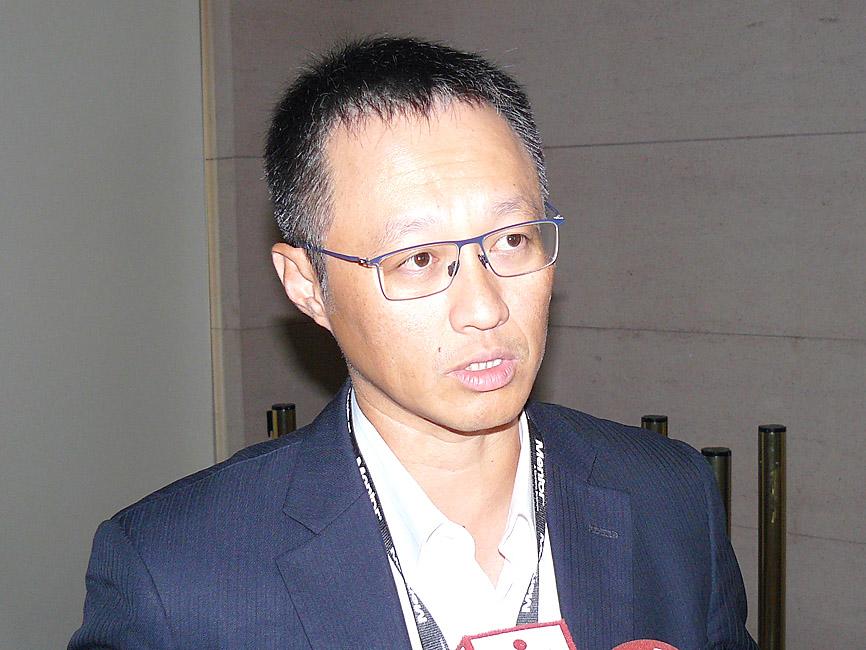Phison Electronics Corp (群聯電子), a supplier of NAND flash memory controllers and modules, yesterday forecast that revenue could grow at an annual pace of 20 percent this year, as a supply crunch and strong demand drive up prices.
The estimate is conservative, the company said, as it is based on it not increasing shipments.
Last year, revenue rose 23 percent to NT$47.56 billion (US$1.68 billion) from NT$38.64 billion.

Photo: CNA
Supply constraints have pushed up the prices for certain flash memorychip controllers, which have surged as much as 50 percent due to price hikes of key components and packaging services, Phison said.
“Supply is very tight. Customers have recently offered to pay higher prices voluntarily to secure shipments,” Phison chairman Pua Khein-seng (潘健成) told a virtual investors’ conference yesterday.
As supply restraints continue, the company has had to ration chips, he said.
Samsung Electronics Co’s closure of its fabs in Austin, Texas, due to an unprecedented cold snap, has added to the already short supply of chip controllers, he added.
Phison has received requests from customers to increase chip supply in the past two to three weeks, indicating that the effects from Samsung’s fab shutdown could be severe, Pua said.
The company is optimistic about this year’s business outlook, he added.
“The first quarter will be a good [season],” he said. “This year as a whole will be a growing year for Phison. We have a good chance to see a significant expansion.”
The company has set an internal target to boost revenue to NT$100 billion, as it is broadening its product portfolios to flash memory controllers and modules used in enterprise solid-state drives, and automotive and industrial devices.
It is also expanding its workforce, with plans to hire 500 new engineers, it said.
Commenting on key component supply constraints faced by most companies, Phison said it should not be a problem for the firm, as it has amassed inventories of passive components that should last for 10 months, and it designs power management chips in-house.
Net profit surged 91.5 percent to NT$8.71 billion last year, compared with NT$4.55 billion the previous year, benefiting from asset-disposal gains. Earnings per share climbed to NT$44.14, up from NT$23.05 in 2019.
Nonoperating profit climbed to NT$5.8 billion last year, from NT$141 million.
The company’s board of directors proposed a cash dividend distribution of NT$23 per common share, representing a payout ratio of 52 percent.
The board also approved a proposal to issue cash dividends twice per year.

On Tuesday, US President Donald Trump weighed in on a pressing national issue: The rebranding of a restaurant chain. Last week, Cracker Barrel, a Tennessee company whose nationwide locations lean heavily on a cozy, old-timey aesthetic — “rocking chairs on the porch, a warm fire in the hearth, peg games on the table” — announced it was updating its logo. Uncle Herschel, the man who once appeared next to the letters with a barrel, was gone. It sparked ire on the right, with Donald Trump Jr leading a charge against the rebranding: “WTF is wrong with Cracker Barrel?!” Later, Trump Sr weighed

SinoPac Financial Holdings Co (永豐金控) is weighing whether to add a life insurance business to its portfolio, but would tread cautiously after completing three acquisitions in quick succession, president Stanley Chu (朱士廷) said yesterday. “We are carefully considering whether life insurance should play a role in SinoPac’s business map,” Chu told reporters ahead of an earnings conference. “Our priority is to ensure the success of the deals we have already made, even though we are tracking some possible targets.” Local media have reported that Mercuries Life Insurance Co (三商美邦人壽), which is seeking buyers amid financial strains, has invited three financial

Artificial intelligence (AI) chip designer Cambricon Technologies Corp (寒武紀科技) plunged almost 9 percent after warning investors about a doubling in its share price over just a month, a record gain that helped fuel a US$1 trillion Chinese market rally. Cambricon triggered the selloff with a Thursday filing in which it dispelled talk about nonexistent products in the pipeline, reminded investors it labors under US sanctions, and stressed the difficulties of ascending the technology ladder. The Shanghai-listed company’s stock dived by the most since April in early yesterday trading, while the market stood largely unchanged. The litany of warnings underscores growing scrutiny of

OUTLOOK: Among the six sub-indices, only the stock market confidence sub-index rose due to strong equity performance and expectations of a US Federal Reserve rate cut Consumer confidence weakened further this month, sliding to its lowest level in two-and-a-half years as households grew increasingly uneasy about the economic outlook, job security and big-ticket spending, a survey by the National Central University showed yesterday. The consumer confidence index fell 1.07 points from last month to 63.31, the weakest number since May 2023, said the university’s Research Center for Taiwan Economic Development (RCTED), which conducts the monthly poll. “Although the Directorate-General of Budget, Accounting and Statistics recently increased Taiwan’s GDP growth forecast for this year to 4.45 percent, consumer sentiment tells a different story,” RCTED director Dachrahn Wu